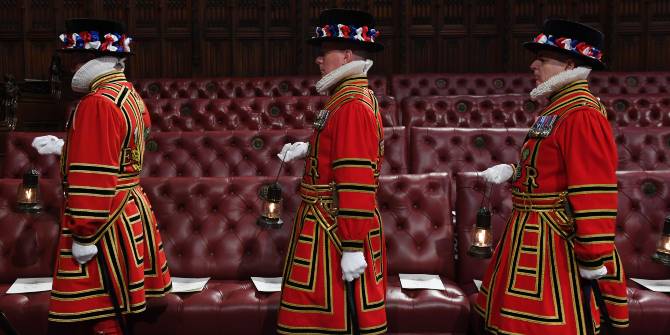‘Taking back control’ was a key element of the Leave campaign’s case for Brexit, but why did the principle find such resonance among the British public? Drawing on a new study, Susanne K Schmidt (University of Bremen) says it is important to recognise that some core features of the UK polity contrast with the EU’s political system. These institutional differences formed the foundations for Britain’s decision to leave.
The political process leading to the Leave vote in the EU referendum was fraught with contingencies. If David Cameron had not promised a referendum, if the tabloids had not been so nationalistic, or if austerity measures had not hit social spending to the extent they did, the picture today could be very different. Many analyses have focused on political preference formation and the politicisation of EU membership against an English lack of European identity. Others have focused on the economic underpinnings of the vote. Surprisingly, however, scant attention has been paid to the institutional foundations of Brexit.
A case of institutional mismatch

Vis-à-vis other EU member states, the UK is unique with its strong majoritarian traits. As a common law country with a tradition of parliamentary sovereignty, there is a significant mismatch between the UK’s institutional features and the prevailing mode of policymaking in the European Union. Integration in the EU is very much ‘integration through law’ with rulings of the European Court of Justice (ECJ) giving important impulses.
Once the ECJ declared the Treaty’s direct effect and supremacy in the 1960s, case law interpreting its rules as quasi-constitutional requirements was able to push integration beyond what legislative majorities could have achieved. Dieter Grimm has coined the term ‘over-constitutionalisation’ to characterise the resulting limits for majoritarian decision-making. It comes as no surprise that the way the ECJ can shape policymaking in the EU stands in stark contrast to the UK’s pronounced majoritarian traits.
This is particularly true if we consider another feature of the UK polity: it is a common law country, implying that legal principles set by judgments are treated as law. The UK administration is well versed in implementing case law directly. While its majoritarian tradition lets the UK be particularly sensitive to the loss of sovereignty rooted in over-constitutionalisation, the common law tradition means that these constraints will likely be implemented with explicit reference to the ECJ!
The importance of intra-EU migration…
In the Brexit process, the extent of intra-EU migration to the UK was a major concern. Given the high salience of this issue, it is revealing how strongly ECJ case law structures the rights of EU citizens working and living in other member states. The right to freedom of movement of workers was already included in the Treaty of Rome, including ‘the abolition of any discrimination based on nationality between workers of the Member States as regards employment, remuneration and other conditions of work and employment’ (Article 48 (2) now Article 45 TFEU, Treaty on the Functioning of the European Union). Expecting that other member states would immediately grant free movement rights after the 2004 eastern enlargement, the UK renounced the possibility of a transition period.
The non-British resident population grew from 5% in 2004 to 8.4% in 2014, and migration from Poland during that time has been described as possibly the largest movement between two countries in peace times. The extent of migration was not only substantial; it also has to be seen in the context of several institutional characteristics of the UK.
To begin with, inhabitants in the UK are not obliged to register with the authorities. Official data on migration therefore works with estimates. The British welfare state relies in part on non-contributory provisions. In-work benefits complement a flexible labour market, giving incentives for taking up work, even if it is low-paid. Labour regulations are hardly enforced. This combination leads to a propensity to attract lower skilled migration, causing workers with lower wages to come under pressure while higher wages profit from additional labour supply. Although analyses have shown benefits overall from intra-EU migration, these benefits were not equally distributed.
…and judicialised rights to equal treatment
For our context, it is important to understand how crucial ECJ case law was for shaping the free-movement regime, and to elucidate the constitutional requirements following directly from the Treaty as well as the conditions resulting from secondary law. After the Treaty of Maastricht took a further step by introducing EU citizenship rights in Article 18 TEC, the Court embarked on a journey that appeared to promise equal rights to EU citizens regardless of their financial means. It continued doing so even after the Citizenship Directive of 2004 made clear that member states were keen to uphold differences in entitlements between economically active and inactive EU citizens. Only in autumn 2014, with the case of Dano (C-333/13), did the Court start to take the restrictions on equal treatment introduced by the directive seriously.
Because a non-contributory, tax-financed welfare system is very open to claims by migrants, particularly as there is no registration requirement, the UK had introduced a habitual residence test as early as 1994. Previously, income support had been granted irrespective of length of residence in the UK. For the definition and determination of habitual residence, the UK government uses criteria established by the ECJ in its case law, reflecting the common law tradition.
At the time of the eastern enlargement in 2004, the government introduced a right-to-reside test to ensure that EU citizens settling in the UK are either self-sufficient or economically active. As UK nationals do not need to pass the test, it discriminates against EU citizens. The European Commission started an infringement procedure in 2010 that was handed to the ECJ in 2013. Just days before the June 2016 referendum, the ECJ ruled in favour of the UK (C-308/14).
The common law tradition allowed judicial principles to directly inform administrative practices, leaving the reference to the ECJ‘s interpretations intact. Thus, a revised habitual-residence test with more individualised questions, including queries regarding efforts to get into work, mirrored the ECJ’s requirement for individual assessments in its ruling in Brey (C-140/12). The Genuine Prospect of Work test introduced in mid-2014 follows the case Antonissen (C-292/89), whereby the eligibility of EU citizens for jobseekers’ allowance is linked to their ‘genuine chances of being engaged’ (No. 21). ECJ criteria for the status of ‘worker’ were also taken up: employment needs to be ‘genuine and effective’ and not only ‘marginal and ancillary’ (case 53/81 Levin).
The institutional roots of ‘taking back control’
Intra-EU migration was the single most important political issue leading to the politicisation of EU membership, resulting in the vote for Leave. Once the decision against a transition period was taken, Britain’s flexible labour market and wage differentials motivated significant and unexpected migration from the new eastern member states.
That the slogan ‘take back control’ could find such resonance is rooted in the institutional mismatch between an EU that has constitutionalised and judicialised many policy choices, and the UK common law tradition that made the stark contrast with legitimacy rooted in parliamentary sovereignty so evident. But Brexit also shows how constitutionalising policy choices, and accepting case law rather than political preferences to shape policy decisions, carries a danger of shifting political contestation to another level.
For more information, see the author’s accompanying article in the Journal of European Public Policy. This post first appeared at LSE EUROPP and represents the views of the author and not those of the Brexit blog, nor LSE.







Two points are worth making.
The first is that the British and the constituent nationals have long resisted what they perceive to be ‘rule from abroad’.
This was demonstrated by resistance to the Romans, the Normans, the Spanish, Bonaparte and Hitler. And while history paints a congenial image of the Glorious Revolution in 1688 and the arrival of the Hanoverans soon after, both were sold at the time as acts of a sovereign government inviting people to rule as constitutional monarchs.
The founders of the European Project knew that to complete it they would have to overcome British public resistance to rule from abroad. The EP was conducted by stealth under the cover of ‘oh, it’s just a trading bloc’. Heath took the UK into the EEC without a mandate, and was rejected by the public. The next PM, Harold Wilson, saw the unrest and offered a referendum on EEC membership.
In 1992, the EC (as it was then known) overplayed its hand by creating a superstate called the European Union. John Major (who by then had never fought a general election as Tory leader) did not have a mandate to participate in this, and the Tories were removed from office later that year. In 1993, after the formation of UKIP, the awful truth began to emerge about the EU, and the comment ‘oh, it’s only a trading bloc’ evaporated from the discussion.
The creation at Maastricht of the ECJ and the concept of EU ‘citizens’ told the population what the EU was about. Add to this the growing number of member states, and by 2010 opposition to our membership was growing. Anti-EU parties ‘won’ the UK EP elections every year since 2014, and it was that first ‘victory’ that encouraged Cameron as Tory PM to offer a pledge of an EU membership referendum in 2015. He was duly elected, and the Referendum of 206 saw the UK vote to leave.
The EU’s model is not replicated anywhere else. No other trading bloc has a central organisation that confers citizenship or makes laws for member states that override national law.
The EU will soon be a mere blip on the face of Europe, but nationalism will be with us for ever. It has always been with us, from the earliest times of mankind when tiny tribes fought to retain control over ‘their’ area.
The second point is that it was often said by Remainers both during the Referendum campaign and long afterwards that Leavers were thick and that they did not know what they were voting for. However, it is plain that it is the Remainers who didn’t understand the concept of ‘taking back control’, and many admit to not knowing even today. I am constantly having to inform them of the nature of the EU’s control over member states. Many of them have no idea what an EU Regulation is, fgs.
A most interesting article, thank you Susanne K Schmidt. I wonder if you or some other German expert would like to comment on this blog about the bombshell the German Constitutional Court lobbed in the direction of the European Central Bank two days ago. Or is some article already in the works?
On the original article, a lot of it is too technical for me. What I found surprising was that, so far as I could understand it, a lot of it when translated into simple English would turn into something that would be appropriate for a Leave campaign leaflet. For example: “Once the ECJ declared the Treaty’s direct effect and supremacy in the 1960s, case law interpreting its rules as quasi-constitutional requirements was able to push integration beyond what legislative majorities could have achieved.” means to me that the ECJ promoted integration beyond the will of national (or other) parliaments; “After the Treaty of Maastricht took a further step by introducing EU citizenship rights in Article 18 TEC, the Court embarked on a journey that appeared to promise equal rights to EU citizens regardless of their financial means. It continued doing so even after the Citizenship Directive of 2004 made clear that member states were keen to uphold differences in entitlements between economically active and inactive EU citizens” means or at least implies that the ECJ was forcing unconditional equal rights for EU citizens on member states despite them authoritatively expressing their resistance to this principle. I find these sentiments in the article surprising, since I would not expect the University of Bremen to be a hotbed of Leave radicalism. I don’t really know what to think, but if Susanne K Schmidt is correct in these statements it seems to me an argument why the UK voters would have been correct to have said Yes to the authority of parliamentary democracy and No to the undemocratic power of the ECJ.
Prof Schmidt does have history in this area though. There is more detail in her article for the FAZ (German broadsheet) which appeared a year ago:
https://www.faz.net/aktuell/politik/die-gegenwart/susanne-k-schmidt-der-brexit-ein-dilemma-auch-fuer-die-europaeische-union-16046145.html?printPagedArticle=true
I recommend the article to readers of this blog, even if they have to run it though Google Translate or DeepL to read it.
You made some interesting points, and you are factually correct.
I would highlight two important facts.
The first of which is that German universities will be concerned primarily with factual accuracy, not the spread of EU propaganda.
The second (which is linked to the first) is that the greatest source of Leave literature and arguments is the EU itself.
I cannot have been the only person in the UK who looked at the EU’s own websites in 2016 in a bid to verify Leave’s claims. Throughout my entire life (I was born in 1961) the issue of the European Project and Britain’s membership of it has been played out. I would have voted Leave in 1975 had I been old enough, but even then the Project was being touted as ‘a trading bloc, and nothing more’.
I knew we had been lied to in 1993, when the debate about Maastricht the year before was taking shape.
The EU is its own worst enemy. Much of its output adds grist to the mill of those who are opposed to its existence, and that doesn’t just apply to the UK. The shenanigans about the Lisbon Treaty was for many across Europe the final straw. France and The Netherlands held referendums that blew the Project out of the water, because it was a step too far. The EU responded by moving the goalposts and ratifying it anyway.
The EU is a fraud. I could give multiple examples of this, but the simplest is the wording and content of Article 50 of LIsbon.
It was written simply because the EU honestly believed it would never be used. It could have said ” Send us a letter saying your state is leaving, accompany the letter with a picture of your head of state’s bare posterior, and we’ll tear up your membership.”
The reality is that the UK invoked Article 50 in 2017 and did not leave until January 2020.
Trading blocs are a wonderful idea, and I’m particularly impressed by the arrangements between Australia and New Zealand and the one between Canada and the USA. There is freedom of movement, both respect the flora/fauna of each state; the crucial difference with the EU is that none of these arrangements impose laws on the participants.
Europe will never be part of a successful empire. Its peoples are too diverse and bolshy. We are a great family when we don’t interfere with each other.
“I would have voted Leave in 1975 had I been old enough, but even then the Project was being touted as ‘a trading bloc, and nothing more’.” By whom? The LSE has kindly put the official Remain leaflet for 1975, which was distributed to all households, online. https://digital.library.lse.ac.uk/objects/lse:fuv593baz . I don’t see anything there about the European Community being “a trading block, and nothing more”. There is for example a lot about security (“dangerous time in a dangerous world” on page 2 and the quote from Roy Jenkins on page 3) which wouldn’t be relevant if the EC were just a trading block.
I’ve read that leaflet many times over the decades, and even today I’m astonished at its deceit.
The ‘arguments’ for staying in are expressed in economic terms, thereby emphasising the trading bloc aspect of the EEC. After all, its very name is a bit of a clue to the deception. It could equally have been called the European Politically-bound Community, because even then EEC laws were superior to those of member states.
There wasn’t “a lot” about the subject of security. Jenkins mentioned it once, and he failed to substantiate any of his claims. Europe’s security has been guaranteed by NATO since 1949.
Hi Gary, my question was two words, “By whom?”, but you have used a great many more words in not answering it.
I answered ‘by whom?’ with this:
“The ‘arguments’ for staying in are expressed in economic terms, thereby emphasising the trading bloc aspect of the EEC. ”
The people who produced the leaflet.
This is ridiculous. You claimed “the Project was being touted as ‘a trading bloc, and nothing more’”. There was nothing in the YES pamphlet to suggest that the European Community is nothing more than a trading block, and rather a lot (such as the repeated references to security) which suggests strongly it is something more. Only an exceptionally stupid voter in 1975 would have read the pamphlet’s economic arguments as somehow equating to a guarantee that the European Community was “nothing more than a trading block”.
We’ve often heard on this blog the legend that the voters in 1975 were misled on a large scale into voting for membership of the European Community as “nothing more than a trading block” which is why I’ve devoted several posts to exploding it. In fact I think phrases like the “United States of Europe” (which of course implies very much more than a trading block) as used by Churchhill in 1946 (https://winstonchurchill.org/resources/speeches/1946-1963-elder-statesman/united-states-of-europe/ ) were fairly common, for example I recall a Giles cartoon on the subject which assumed that readers of the Daily Express were familia r with the phrase. Or if you want a more authoritative source, a little Googling finds me Edward Heath’s speech to the Tory Party conference in 1973 http://www.britishpoliticalspeech.org/speech-archive.htm?speech=120 where, for example, he says “By the end of the year major decisions [by the Community] will have to be taken over a very wide field including economic and monetary union, and social and regional policy” and “Our purpose in meeting together would be to lay down the broad direction of European policy, to keep up the momentum towards greater unity in foreign policy”
So to sum up, I think anyone adult voter in 1975 who thought the European Community was nothing more than a trading block just hadn’t been paying attention. There were probably still some such voters, just as I daresay some didn’t vote Labour in 2019 because they were convinced Jeremy Corbyn was an alien lizard, but that was not enough to invalidate the democratic decision taken back then. (Just as I respect the result of the 2016 referendum despite the numerous imperfections.)
“Once the decision against a transition period was taken, Britain’s flexible labour market and wage differentials motivated significant and unexpected migration from the new eastern member states.”
I would suggest there is one other factor which put the UK relationship with the EU out of kilter.
From wikipedia …. “English is the language taught most often at the lower secondary level in the EU. There, 93% of children learn English. At upper secondary level, English is even more widely taught.”
Quite clearly this creates a propensity for a would EU migrants to move to the UK rather than most other countries.